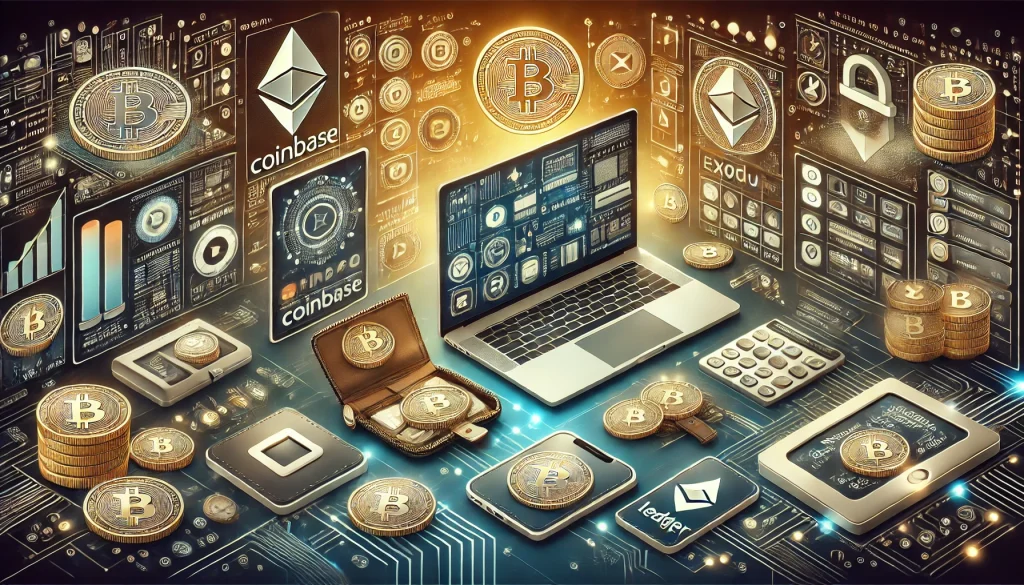What is a Crypto Coin? A Complete Guide for Beginners
Cryptocurrencies have gone from being a niche interest to a global phenomenon, with crypto coins at the forefront of this revolution. Whether you’re looking to invest or just curious about how they work, understanding crypto coins is essential. In this guide, we’ll explain what they are, how to buy and store them, and why they matter to today’s digital economy.
What is a Crypto Coin?
A crypto coin is a type of digital money that operates on its own blockchain. A blockchain is a decentralized system that securely records transactions. The most popular example of a crypto coin is Bitcoin (BTC), which runs on the Bitcoin blockchain. Other examples include Ethereum (ETH), Litecoin (LTC), and Ripple (XRP).

Crypto coins serve as a medium of exchange, similar to traditional money. However, unlike regular currencies like the dollar or euro, crypto coins are not controlled by any government or central bank. They exist only in digital form on the blockchain, where transactions are verified and recorded by a network of users.
Key Features of Crypto Coins:
- Decentralized: No single entity, like a bank or government, controls crypto coins. A network of users and miners manages them.
- Secure: All transactions are recorded on the blockchain, which uses cryptography to ensure security and transparency.
- Global: Anyone with internet access can use crypto coins, making them perfect for global transactions and financial inclusion.
- Limited Supply: Many crypto coins, such as Bitcoin, have a fixed supply. This scarcity can increase their value over time.
How Do Crypto Coins Work?
Crypto coins are created through mining (for coins like Bitcoin) or staking (for coins like Ethereum). Mining involves solving complex problems to confirm transactions and add them to the blockchain. Miners who solve these problems receive newly minted coins as a reward.

Once miners have created the coins, users can spend them, invest in them, or trade them on exchanges.
Why Are Crypto Coins Important?
Crypto coins are reshaping the world of finance, offering new possibilities and opportunities. Here’s why they matter:

1. Decentralization and Financial Independence
One of the biggest advantages of crypto coins is that they are decentralized. Unlike traditional currencies, which are controlled by governments and central banks, crypto coins operate on a peer-to-peer network, free from the influence of any single authority. This means that no bank, government, or institution can manipulate the value or supply of these coins.
For many people, this offers greater financial freedom. With crypto coins, you don’t need a bank account to make transactions, and you can send money anywhere in the world with just a few clicks. This level of control can be especially important for people in countries with unstable currencies or limited access to banking.
2. Security and Transparency
Crypto coins run on blockchain technology, a decentralized ledger system that records all transactions publicly. Once a transaction is added to the blockchain, it cannot be altered or deleted. This makes the system incredibly secure and transparent.
Because all transactions are visible on the blockchain, anyone can check them, ensuring that no one can manipulate the transaction history. This level of transparency reduces the risk of fraud and provides confidence in the integrity of the system.
3. Global Accessibility
Crypto coins are global and can be used by anyone, anywhere in the world, as long as they have internet access. Unlike traditional banking, which often requires intermediaries and can be slow or expensive for international transfers, crypto coins make cross-border transactions quick and affordable.
This is especially important for people in regions with unstable currencies or limited access to financial services. Cryptocurrencies allow people to store value and make transactions without relying on traditional banks, which can be out of reach for many in developing countries.
4. Potential for High Returns
Crypto coins have massive growth potential. While the market is volatile, early investors in Bitcoin, Ethereum, and other crypto coins have seen significant returns. Some cryptocurrencies have experienced tremendous price increases, and this potential for high rewards continues to attract investors.
However, it’s important to remember that cryptocurrencies are speculative investments, and prices can be unpredictable. This makes crypto coins a high-risk, high-reward investment option, but the possibility of significant profits remains a key draw for many people.
5. Blockchain Technology: A Game-Changer
While crypto coins are the most visible application of blockchain technology, blockchain itself has far-reaching implications beyond digital currencies. Blockchain can be used to improve transparency, security, and efficiency in many industries, including:
- Supply Chain Management: Blockchain can track goods from production to delivery, ensuring authenticity and reducing fraud.
- Healthcare: Blockchain can secure medical records and streamline the sharing of information between healthcare providers.
- Voting Systems: Blockchain could provide a transparent and tamper-proof way to conduct elections.
As blockchain technology continues to develop, it could disrupt industries far beyond finance.
6. Privacy and Control
Crypto coins offer a higher level of privacy compared to traditional financial transactions. While transactions are recorded on the blockchain, they do not necessarily reveal personal details about the sender or receiver. This anonymity can be appealing to people who value privacy in their financial dealings.
Additionally, with crypto coins, you have full control over your money. You are your own bank, and no one can freeze or seize your assets without your permission. This control and privacy are important for many people seeking alternatives to traditional financial systems.
7. Innovation in the Financial System
Crypto coins represent a new era of financial innovation. They are helping to move money into the digital age, making financial transactions faster, cheaper, and more secure. Cryptocurrencies are also the foundation for emerging technologies like Decentralized Finance (DeFi), which is reshaping how people lend, borrow, and invest without relying on banks.
Crypto coins are also driving the development of smart contracts—self-executing contracts with terms directly written into code. These contracts automatically execute once certain conditions are met, eliminating the need for middlemen and reducing costs.
8. A Hedge Against Inflation
Some people view crypto coins as a hedge against inflation. For example, Bitcoin has a fixed supply—only 21 million coins will ever exist. This limited supply can help protect against inflationary pressures that affect traditional currencies. When central banks print more money, the value of fiat currency can decrease. However, because there is a set supply of crypto coins like Bitcoin, their value may be less affected by inflation.
How Do Crypto Coins Work?
Crypto coins work through a technology called blockchain. A blockchain is a decentralized digital ledger that records all transactions across a network of computers. Each transaction is grouped into a “block” and linked to previous blocks, forming a chain. This ensures that no one can change or tamper with the transaction history.
Mining and Staking
Crypto coins are created through two main methods: mining and staking.
- Mining: Some coins, like Bitcoin, are created through mining. In this process, powerful computers solve complex mathematical problems to verify and confirm transactions. Miners who solve these problems are rewarded with newly created coins. Mining is an essential part of maintaining the security and integrity of the blockchain.
- Staking: Other coins, like Ethereum 2.0, use staking. Instead of solving problems, users “stake” (lock) their coins in the network to help validate transactions. In return, they earn rewards in the form of additional coins. Staking requires less energy than mining and is often seen as a more eco-friendly option.
Transactions
Once you have crypto coins, you can use them in various ways. When you send or receive crypto coins, the transaction is broadcast to the blockchain network. Computers in the network (called nodes) verify the transaction and add it to the blockchain. This process ensures that every transaction is secure, transparent, and irreversible.
Wallets
To use crypto coins, you need a wallet. A crypto wallet is a digital tool that allows you to store, send, and receive your coins. It contains a private key (your unique password) and a public key (your public address). Your private key gives you access to your coins, while the public key is used to receive them.
Why It Works
The combination of mining (or staking), secure blockchain technology, and decentralized networks makes crypto coins work efficiently and safely. By eliminating intermediaries like banks, crypto coins allow for faster, cheaper, and more secure transactions.
In short, crypto coins operate on a system of trust and transparency, where everyone in the network ensures that transactions are valid and secure. This makes them a powerful alternative to traditional forms of money.
Why are Crypto Coins Important?
Crypto coins are changing the way we think about money. They provide a decentralized and borderless alternative to traditional currencies. They offer fast, secure, and low-cost transactions that are available to anyone with internet access. Additionally, the underlying blockchain technology has the potential to revolutionize other industries, such as finance, healthcare, and supply chain management.
In short, crypto coins are much more than just a digital form of money—they represent a shift toward a more decentralized, secure, and efficient financial system.
Crypto Coins vs. Crypto Tokens: What’s the Difference?
While crypto coins and crypto tokens are often mentioned together, they’re not the same. Here’s the difference:
- Crypto Coins: These are the native currencies of a blockchain. For example, Bitcoin is the coin of the Bitcoin blockchain, and Ethereum is the coin of the Ethereum blockchain. Coins are primarily used for payments, investments, or as a store of value.
- Crypto Tokens: Tokens are built on top of existing blockchains. They have specific uses in different projects, such as powering decentralized applications (DApps), voting in governance, or participating in DeFi platforms. For example, Chainlink (LINK) and Tether (USDT) are popular tokens.
So, while both coins and tokens are part of the cryptocurrency ecosystem, coins are the currencies of their blockchains, and tokens serve specific purposes within projects or platforms.
Why Are Crypto Coins So Popular?
Crypto coins have become increasingly popular in recent years. Here are a few reasons why:
- Security and Decentralization: Crypto coins are decentralized, meaning they aren’t controlled by any central authority. This makes them secure and transparent. All transactions are recorded on a public ledger called the blockchain, which prevents fraud and ensures trust.
- Potential for Profit: Many people are attracted to crypto coins because of the potential for high returns. While the market is volatile, early investors in Bitcoin and Ethereum have seen significant profits. This makes them attractive to people looking for investment opportunities.
- Global Reach: Crypto coins allow people to send and receive money across borders quickly and with low fees. This makes them especially useful for people in countries with unstable currencies or limited access to traditional banking systems.
- Blockchain Technology: Blockchain is a revolutionary technology that has many applications beyond crypto. By using crypto coins, you’re also tapping into the larger blockchain ecosystem, which includes everything from decentralized finance (DeFi) to supply chain tracking.
- Privacy: While not completely anonymous, crypto transactions offer more privacy than traditional banking. This appeals to individuals who value discretion in their financial dealings.
How to Buy and Store Crypto Coins
If you’re ready to buy and store crypto coins, here’s how you can get started:

1. Choose a Crypto Exchange
The first step in buying crypto coins is choosing a reliable exchange. A crypto exchange is a platform where you can buy, sell, and trade cryptocurrencies. Some of the most popular exchanges are:
- Coinbase: Coinbase is user-friendly, making it easy for beginners to buy Bitcoin, Ethereum, and other coins.
- Binance: Binance is one of the largest exchanges, offering a wide selection of cryptocurrencies and advanced trading features.
- Kraken: Kraken is known for its strong security features and a wide range of coins.
When picking an exchange, make sure it is reputable, has solid customer support, and offers the coins you want to buy.
2. Set Up a Wallet
After buying crypto coins, you need to store them in a crypto wallet. A wallet is a digital tool that lets you store, send, and receive your cryptocurrencies. There are two types of wallets:
- Hot Wallets: These are connected to the internet and are easier to use. Examples include software wallets like Exodus and mobile wallets like Trust Wallet.
- Cold Wallets: These are offline wallets, such as hardware wallets (e.g., Ledger or Trezor), offering extra security. Cold wallets are ideal for long-term storage of large amounts of crypto.
3. Make Your First Purchase
Once you’ve set up your wallet, you’re ready to make your first purchase. Most exchanges let you buy crypto using traditional money, such as USD or EUR. After you buy your coins, it’s a good idea to transfer them to your wallet for safekeeping.
What Does the Future Hold for Crypto Coins?
The future of crypto coins looks bright. The technology behind them—blockchain—is constantly evolving, and more businesses and governments are embracing it. While the market remains volatile, the demand for cryptocurrencies continues to grow, and more industries are finding ways to incorporate them.

For younger generations, who are already tech-savvy and comfortable with digital platforms, cryptocurrencies represent an exciting way to engage with money. The growing adoption of crypto means that it is slowly becoming a regular part of daily life, from gaming to online shopping and even travel. Crypto coins are no longer just for investors—they’re becoming an essential part of the digital economy.
Why You Should Start Playing with Crypto Coins Now
If you’re interested in exploring crypto coins, why not start today? Many online platforms, including gaming and gambling sites, are beginning to accept cryptocurrencies as payment. This gives you a fun way to learn more about digital currencies while playing your favorite games. Not only can you start earning crypto coins, but you also have the potential to see the value of your coins grow over time.
By diving into the world of crypto, you’ll gain valuable experience and understanding that can help you make smarter financial decisions in the future.
Conclusion: Step Into the Future with Crypto Coins
Crypto coins aren’t just a trend—they represent a shift in how we think about money and technology. Whether you’re looking to invest, play, or learn, now is the perfect time to get involved.
So, why wait? Explore the world of crypto coins today and see what opportunities await. With a growing community, ever-improving technology, and endless possibilities, crypto is the future—and it’s here to stay.










